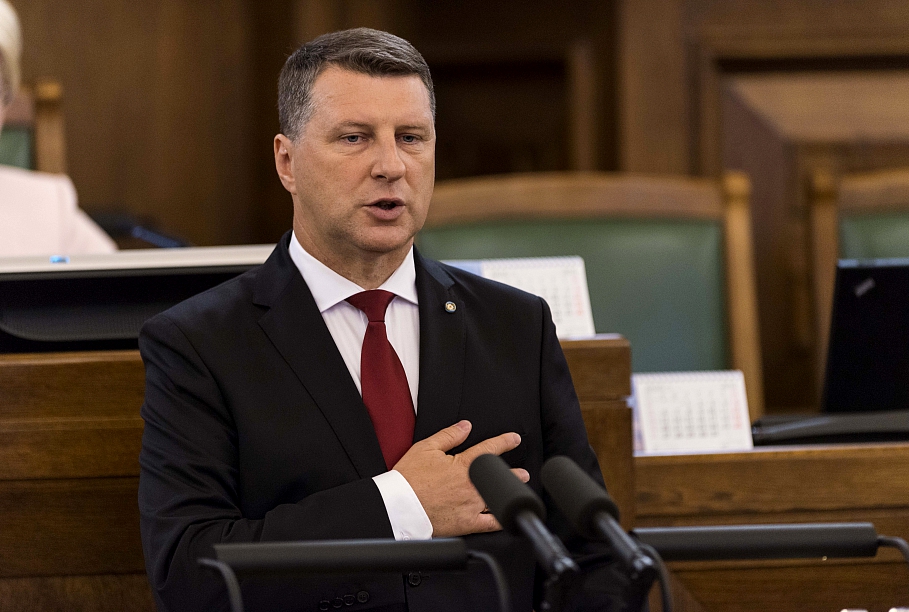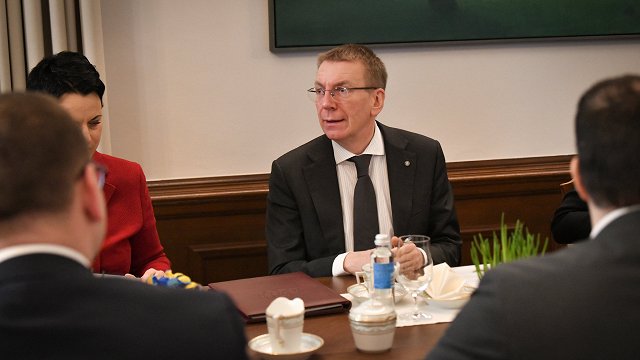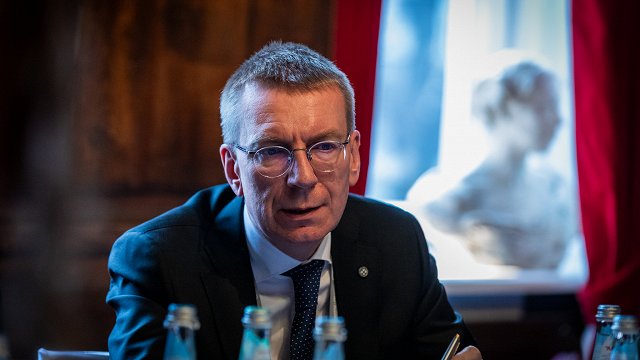In the presidential address that followed the oath taking, Vējonis stressed security in the broad sense of the word - including social, military, ideological and economic security - to be one of his top priorities in office.
Talking about the presidential office and the president's duties, he said that "what's most important is contributing to the development of the state, that the people are prosperous, more happy and more secure."
Vējonis called for people to think about what's good for Latvia in the long-term, and said that political neutrality will be an important aspect of his presidency.
Vējonis also said that even though there are often talks about the society being "split" in Latvia, it is "neither wise nor patriotic to stress and exaggerate this divide."
"We have to work on a common interpretation of the history of Latvia. However, there are no different 'Latvian' and 'non-Latvian' ways to plow the soil or sow grain," said Vējonis.
He mentioned the supermarket collapse in Zolitūde a year and a half ago, saying that the nationality of the victims or the rescuers wasn't important - it's the human lives, Latvia's lives that were important.
"That's why we should remember that love is stronger than holding grudges, and forgiveness is stronger than hate," said Vējonis.
He also said that we should strive, commonly so that "crooked, populist ideas spread by our opponents don't become popular." He said that one of these populist ideas is that Latvia's integration in the West has not been successful, that we are only getting hurt by the West and that Eastern perspectives are better for Latvia.
The president said that he won't seclude foreign from interior policy and that his work will be lead by one single task - strengthening the state and security of Latvia.
After receiving the keys to the House of Blackheads where the office of president is currently located, Vējonis also talked with some schoolchildren and foreigners by the Freedom Monument.
Vējonis is the first green president in the European Union – in name at least.
What follows is a short biography of the president, followed by an overview of the new Chancery of the President of Latvia.
Vējonis, 49, was born near Pskov in Russia while his father was serving in the military, just across the border from his Latvian homeland which at that time in 1966 was occupied by the Soviet Union.
He trained as a biologist at the University of Latvia in 1989 while teaching biology in the small central Latvian town of Madona and also studied in Estonia and Finland, specialising in environmental engineering.
In 2002 he was appointed by reforming Prime Minister Einars Repse as Environment Minister, without being elected to parliament, while serving as a local councillor in Madona.
In 2006 Vējonis was elected to parliament for the Greens and Farmers Alliance grouping which includes the Latvian Green Party of which he is a member.
He is one of the longest-serving of all Latvia's current crop of politicians despite his relatively young age, keeping the environment minister's portfolio through successive coalitions until 2011 when he resumed duties as a regular member of parliament, sitting on foreign policy and national security committees.
That led to a recall to front-line duty in January 2014 when Prime Minister Laimdota Straujuma appointed him Defence Minister. It was widely speculated at the time that he might be too weak, particularly in comparison with his hawkish predecessor Artis Pabriks, however Vējonis has managed to disprove the doubters by taking a tough stance on Russian aggression and even blasting Greens and Farmers Alliance kingpin Aivars Lembergs as a “threat to national security” after he described NATO troops in Latvia as “occupiers.”
As well as his native Latvian, Vējonis speaks fluent Russian and English. He is married with two children and lists his religious views as “pagan” on his Facebook page.
The President's Chancellery will be led by Aleksandrs Bimbirulis who held this post during most of the previous presidency.
Bimbirulis is an economist and had worked as a regional manager for SEB before he joined the chancellery. Bimbirulis' deputy will be Egita Kazeka, Head of Minister's bureau at the Ministry of Defense.
Under-Secretary of State for European Affairs Maija Manika will be the Foreign Affairs Adviser, while Kristīne Jaunzeme, a Legal Consultant at Saeima, will become the Legal Adviser to the President. Karīna Rāviņa-Vimba will remain at her post as Public Project Management Issues Adviser to the President.
Andis Jēkabsons, the former Press Secretary to the Minister of Defence, will become Press Adviser to the President, while Jānis Kažociņš, former director of the Constitution Protection Bureau, will become the Non-staff Adviser to the President.
Kažociņš has served at the British Armed Forces and was named adviser to the Defence Minister in 2013. He is known as an outspoken critic of Russia's foreign policy.




























